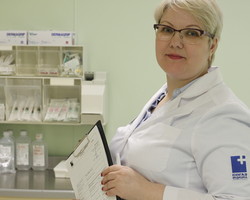Elena Khasanova: ongoing training to ensure safe, quality patient care

Russian Nurses Association
Nurse leaders have a dual responsibility to continue their own professional education and development, and to ensure that the teams around them are adopting new and optimal practices – all in the interest of keeping their patients safe.
Elena Khasanova of St Petersburg, Russian Federation, has fulfilled these responsibilities over the course of her 20-year career as a nurse.
Elena graduated from nursing school in 1999 with a specialization as a feldsher. After working as a nurse anaesthetist for a number of years, she continued her nursing education in 2007, receiving both her bachelor’s and master’s degree in nursing and a master’s degree in management and economy. The latter proved particularly useful, as she was already engaged in management roles and focused on optimizing nursing work.
Today, Elena is Chief Nurse at SOGAZ, a private clinic in St Petersburg, and head of the nursing department at an educational institution. In these roles, she places a strong emphasis on continued training for nurses.
“It is not always easy to change practice,” she says. “It might be challenging and some staff members can oppose changes to the way they have previously done things. In these cases, I suggest to my colleagues some compromise – let’s try this and see what will happen. If a new approach will not be helpful, we can adjust it. But we need to constantly be training nurses in new techniques and approaches in order to achieve our goals.”
For Elena, ensuring patient safety and the safety of her nursing staff is paramount. To support this, she implemented several standards and checklists that help to guarantee safety even in difficult situations – such as when patients experience anaphylactic shock or when nurses can only reach doctors via phone and must administer treatment on their own.
Elena sees continued training and safety as complementary features of strong leadership in nursing: “Ongoing training and safety standards serve as important tools, allowing nurses to provide unified care and to control the quality of care.”
On top of her duties as Chief Nurse and as the head of a nursing department, Elena is a teacher at the Institute of Medical Education of the Almazov Centre and at Bekhterev Nursing College.
“I believe in the strength of education,” she says. “I am sure that the more we give to nursing students, the better-quality nurses we will get in some years when they come to our hospitals. My aim is to give students an understanding of modern nursing care and its core values, such as showing empathy towards the patient.”
As a nurse leader, Elena has a full workload: she develops her own skills, prioritizes the training and development of her staff, and engages in educating the next generation of nurses and future nurse leaders, all while maintaining a focus on keeping her patients and her nursing staff safe.



